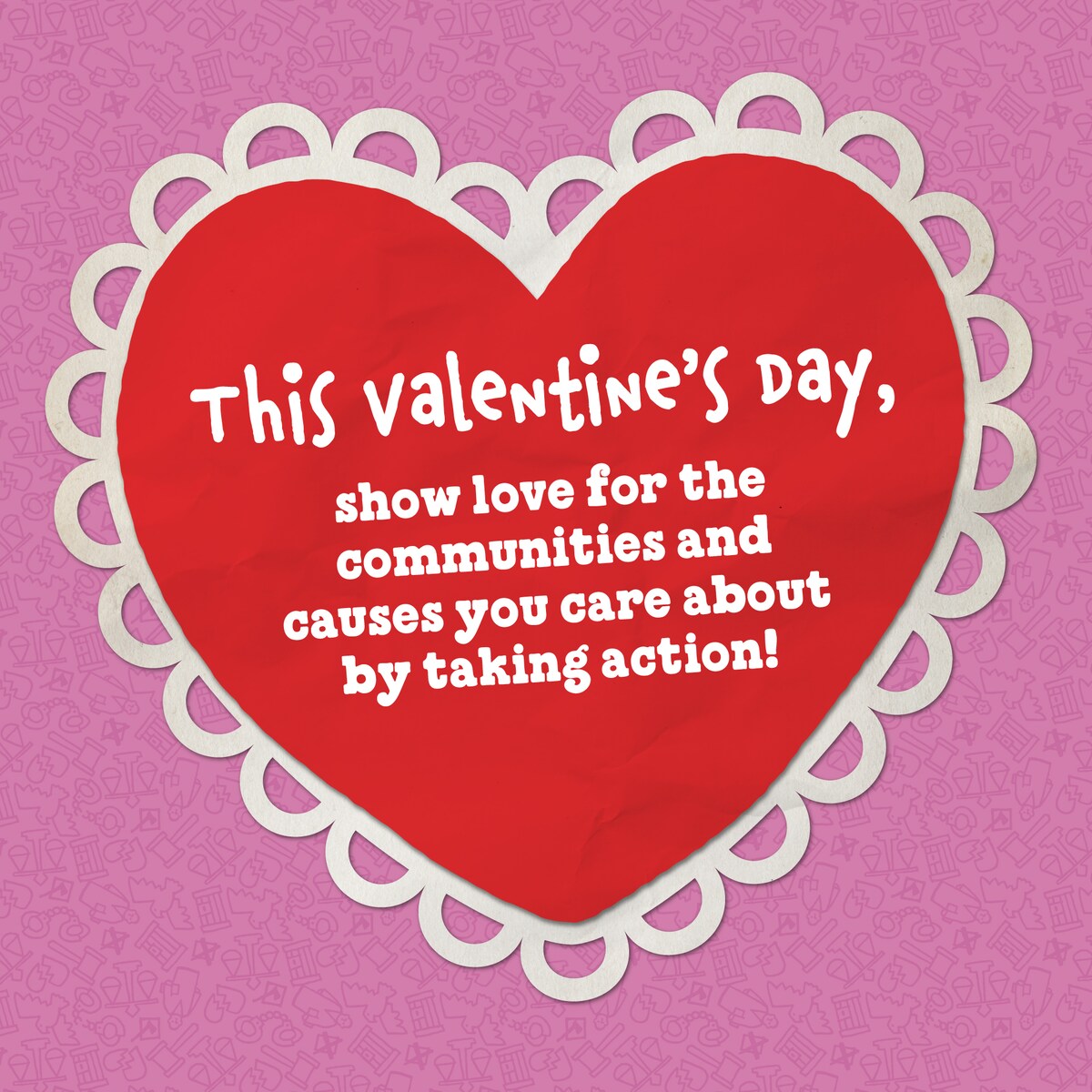September 30, 2022
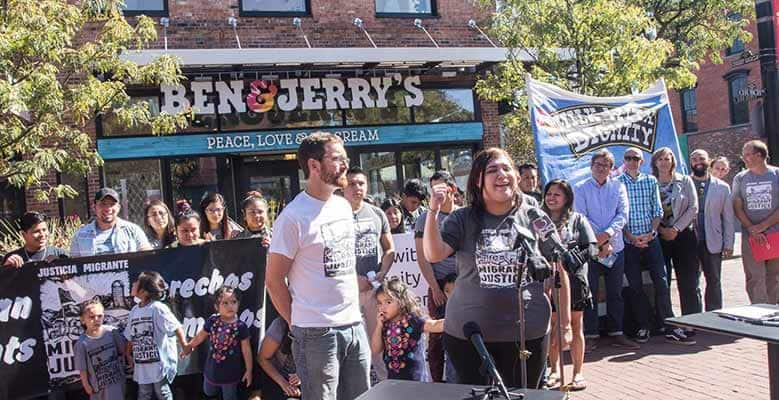
Milk with Dignity is a farmworker-created and farmworker-led program that protects dairy workers’ rights, ensuring safe working conditions, livable wages, and dignified housing. Founded by Migrant Justice, a Vermont-based human-rights organization, Milk with Dignity has transformed the lives of workers across Ben & Jerry’s Caring Dairy farms over the past five years.
We recently had the chance to talk (through a translator) with Thelma Gómez, a dairy worker and Migrant Justice organizer, about her experience working on dairy farms and why farmworker-led programs like Milk with Dignity are so important.
We also want to take a moment to say that Migrant Justice campaigned for years to get Ben & Jerry’s to join the Milk with Dignity program, and while it was not always an easy process, it made us a better company. We wouldn’t be where we are today without the courage of people like Thelma Gómez. We’ll always be grateful to her and to Migrant Justice for helping us be true to our values.
Could you tell us a little bit about how you came to Vermont and started working on a dairy farm?
I came to Vermont from Tabasco, Mexico, when I was 16, just about to turn 17, and I went straight to milking on a farm where my dad was already working. I came without a lot of context, I didn't really know much. I knew that some of the conditions that I was facing, they didn't feel right to me.
I arrived in November, December, when it was just starting to get cold. I remember the hours were really long, and I was the only woman there and I was getting money deducted out of my paycheck for housing, when nobody else was having those deductions. I could see that the bosses didn't give me the same trust that they gave other workers. Other workers were getting raises and I wasn't getting them.
How did you first get involved with Migrant Justice?
I’d been working on the farm a bit and then one day I got an invitation to a Migrant Justice farmworker assembly, and I was really excited because I thought, "Oh, this is going to be an opportunity to meet other farmworkers—and not just other farmworkers, but other women as well." I hadn't met any other women in the community yet. And when I got there, I started to hear about the conditions on other farms. And they talked about things like wage theft and they talked about things like having accidents and being injured at work and not being able to do anything about it, and they talked about the bad housing conditions.
That's when I started to realize, oh, OK, this isn't something that's just on my farm—there are really serious problems happening here. But the workers were also talking about how we had human rights and it didn't matter where we came from, it didn't matter our race or the language we spoke or our gender, but that just by being human beings we had rights that needed to be respected. And that was like a light bulb going off for me, something clicked, and from that point forward I've been committed to organizing with Migrant Justice so that my community can get the rights that we deserve. I think my experience wasn't unique—a lot of workers, when they go to their first farmworker assembly, they also have that experience of feeling like, “I need to be involved in changing these things.”
You have since become a leader in the movement. How did you find your voice? Were you nervous about speaking up?
I think it really started at that first assembly. I remember I actually spoke a lot! I remember thinking, "OK, I just started working, I'm just a kid really, but if I don't speak up, who's going to speak up for me? Nobody else can speak for me if I don't exercise my own voice."
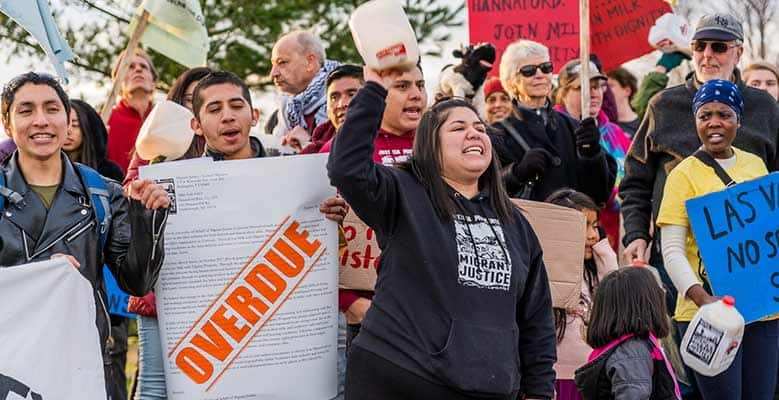
Migrant Justice is led by farmworkers. Can you talk about why that’s so important?
The fact that we are led by the community itself, by a community of farmworkers, is what feels unique to me about the organization. If you look back through our history of almost 13 years, and you look at the history of the campaigns that we've done, they've all been possible because it's an organization led by the workers ourselves. I remember that first assembly, we were talking about the idea of campaigns, that we were going to take action together. (This was before Migrant Justice had won its first campaign, an effort to get the state of Vermont to expand access to driver’s licenses to all residents regardless of immigration status.) We were saying, "OK, how do we come together to win this?" That aspect of Migrant Justice is to me what makes it feel like my home, what makes me so compelled to participate and keep participating in the organization.
What is Milk with Dignity? What does it do and why does it matter so much?
So for us, Milk with Dignity represents a new day for human rights. What's behind Milk with Dignity is what I heard at that first assembly, this idea that we're human beings and we deserve work that recognizes our human dignity and our human rights. But how does it work?
It starts with contracts signed between Migrant Justice as the worker organization, and the companies that buy milk, the buyers. Then we have the code of conduct—these are the standards, written by the workers ourselves, that dictate the dignified conditions on the job and in the housing. Then we have the enforcement of those standards, so we have the independent investigators, the auditors who can respond to workers, who can go to the farms, look at what the conditions are and make sure that farms are complying with workers’ rights as written in the code.
And then we have education. As part of the program, all workers are getting regular education sessions on what their rights are in the code of conduct and how to enforce those rights. And that's super important because rights don't matter unless workers know what they are, and if workers aren't getting educated on what their rights are and how to defend them, then they're only worth as much as the piece of paper they're written on.
The final element is the premium that the buyer pays to support farms in the program so that those farms can make the changes that are needed to improve conditions and meet the code of conduct, because we know that farmers are struggling and don't always have the resources to make those changes.
Migrant Justice campaigned and worked for years to bring Ben & Jerry's on board with Milk with Dignity. Can you talk about what it meant for Ben & Jerry's to agree to join that program five years ago?
When we started to think about this issue and really study it, what we saw is that farmworkers were all experiencing the same things, poor conditions on our farms, wage theft, poor housing, injuries, while at the same time companies at the top of the supply chains were benefiting economically from our work—and that economic benefit wasn't reaching us. So we started to look around at those companies, and obviously Ben & Jerry's is one of them, with roots here in Vermont—they're buying from the farms where we're working, they’re part of the same supply chain. We realized that Ben & Jerry’s has a global brand of social responsibility, but that social responsibility wasn’t being reflected in the reality that we were living in.
It was shocking for us to see that contrast: The public and consumers see the company a certain way, but they aren't seeing the reality that we experience as workers. We thought of Milk with Dignity as the solution for the problems we were seeing, and that’s why we approached Ben & Jerry’s first, to push them to live up to the values they professed.
When we decided that we wanted Ben & Jerry's to be the first Milk with Dignity participant, we reached out and started a conversation. This goes back to your question about Migrant Justice being led by farmworkers. I mean, it was this really unique situation where the farmworkers ourselves got to say, sitting across the table from Ben & Jerry’s executives, "I'm in your supply chain, I'm milking cows on the farms producing the cream for Ben & Jerry's ice cream, and I'm not getting a fair wage." It was a long road and it had a lot of bumps in it, but we were able to get there at the end.
Over the five years of the program with Ben & Jerry's, have you seen improvements for farmworkers?
Yes, absolutely. It almost doesn't feel real because it's worked exactly as we dreamed it would. And when we signed the agreement with Ben & Jerry's, and I was there when we announced the agreement, it was like turning over a new page in the history books for us. It was this thing that we had dreamed about, that we had hoped would happen, and then we got it and it was finally there in front of us. And now five years later, it has transformed workers' lives. They have better wages, there are better health and safety conditions, they have better housing, and if they get injured, they're able to take the time off they need to recover. Their entire quality of life has been improved.
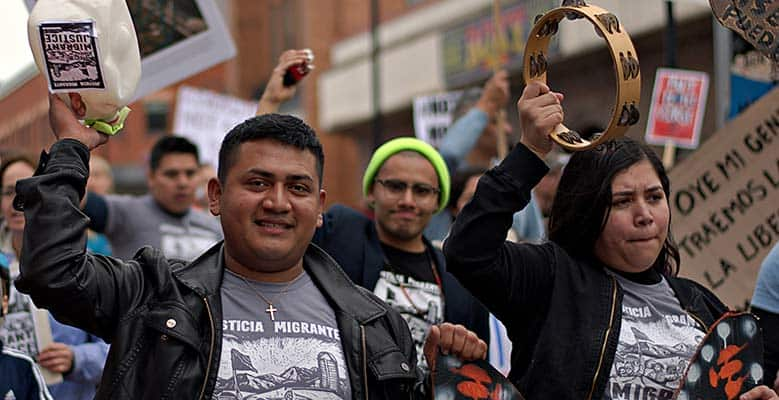
What's next for Migrant Justice and Milk with Dignity? Do you have plans to expand the program to other dairy businesses as well?
We are committed to expanding the Milk with Dignity program, because the changes we’ve seen here with Ben & Jerry’s and dairy farmworkers, they’re not happening for all dairy workers—not all dairy workers in Vermont, not all dairy workers in the region. So we're working to expand the program to bring other buyers in, and that's why right now we have a public Milk with Dignity campaign focused on an invitation to Hannaford, a large grocery retailer. We want Hannaford to make the same commitment to workers behind Hannaford brand milk that Ben & Jerry's made to workers behind Ben & Jerry's ice cream. They need to recognize the responsibility that they have for the rights and wellbeing of those farmworkers, and they need to take concrete action to ensure that their rights and wellbeing are being respected.
We're so committed to expanding the program because, one, we see how it's working, we have all these incredible stories of transformation, of workers whose lives have been changed by the program. But then we also have all these really difficult stories of workers outside of the Milk with Dignity program, whose rights are still being violated, who don't have dignified work, dignified housing. And then especially during the pandemic, especially when COVID started, workers didn't have any protection at all, they were being fired for having COVID, they were afraid of retaliation, they weren’t able to take time off. So that's why we speak with such a clear voice to Hannaford, and sometimes with a little bit of anger in our voice, when we say, "We know what the problem is on the farms in your supply chain, and not only that, we know what the solution is because we have it in place and it's working elsewhere, so you need to get on board."
Are there other organizations that you look to for inspiration or collaboration as you work to expand your movement?
So many, so many I certainly can't list them all, but all sorts of student groups, faith communities, lots of people have supported Migrant Justice over the years, to get us what we are. One organization in particular to mention is the CIW from Florida, the Coalition of Immokalee Workers. And we went down to Florida when we were just starting to think about this program and talked with them, and they were the ones who told us about this model called worker-driven social responsibility. And at the beginning, to be honest, it seemed crazy because I was like, "OK, but what does harvesting tomatoes in the Florida heat have to do with milking cows in the cold in Vermont." It was hard to see what one had to do with the other, but it really worked.
They've been like a sister organization to us. We've gotten a lot of support, we've worked together, we've learned together to develop this model and we've been very inspired and are very grateful for their support.
Many people might not know much about where their milk or their ice cream comes from. What would you like them to understand about what conditions are like on dairy farms and why it matters so much to support the human rights of dairy workers?
People should understand that working on a farm is dangerous work. You're working with large animals, you're working with heavy machinery, you're working with toxic chemicals and you aren't getting training, you aren't getting equipment to keep yourself safe, you're really putting your health, and sometimes your life, at risk doing this job. Another thing that they should know is the long hours and lack of breaks, that workers on dairy farms are working around the clock, 70, 80 hours a week.
Working around the clock, oftentimes seven days a week, not being able to take a day off, not being able to take sick time if you get sick, living in cramped and crowded housing, sometimes five workers are sharing a bedroom together. And we talked about COVID a minute ago—now put those two things together, no sick leave and overcrowded housing, and we've had farms where the entire workforce is getting sick at the same time, 15 dairy workers all sick with COVID.
People should also think about female farmworkers and the issues that we face—sexual harassment, gender discrimination, these are things that women farmworkers deal with every day. It’s important to hear that from workers ourselves. And it’s important to remember that every worker has a family. When you sit with your family around the kitchen table and you're having your yogurt in the morning, or drinking that glass of milk or scooping that ice cream, think about the family behind the product and the experience they're having.
What can people do to support your work and support farmworkers?
Click on our Get Involved link. And please check out our Donation page. We also have an action page for people who want to help with our Hannaford campaign. Following us on social media (Facebook, Twitter, and Instagram) is another great way to hear about events, plans, and campaigns.
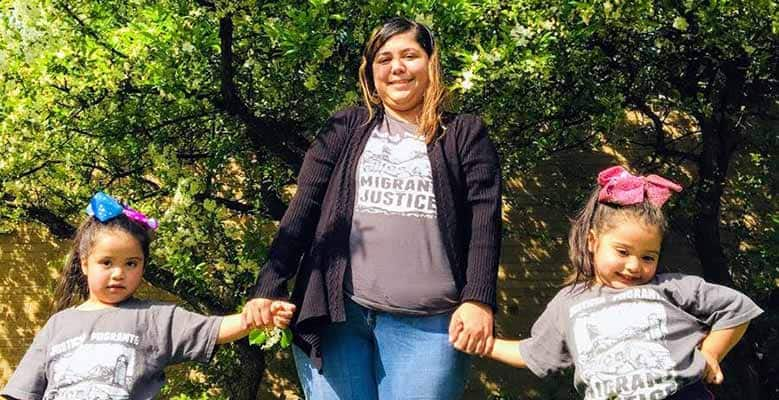
What's next for you? How are you feeling about the work that you've done since you came to Vermont?
I came here young, I didn't have an opportunity to finish my schooling, and so I always say that this has been my education, being involved in this movement has been my university. And it's been an opportunity to let the blindfold come off my eyes. I've been exposed to so much, I've been able to see what's happening around me, to realize what's going on in this world beyond my experience. And again, to understand that as human beings, we all are entitled to fundamental rights, without exception, and that we have a responsibility to struggle to make sure that those rights are protected. And that's what I've been doing, that's what I've dedicated myself to.
I'm a mother as well now, and so having my children, my two girls, gives me an added sense of purpose and responsibility for what I have to do. And as a woman as well, knowing that we have a particular added struggle, we have a particular reality that we have to fight for. All those things together, they've propelled me along my journey. What comes next? I don't know what comes next for me. I know that I'm committed to seeing Milk with Dignity grow and expand. I want to see it on more farms, I want to see more farmworkers covered by the program. I want to be able to keep going to farms and doing those education sessions, to bring the workers together, bring the managers together, and say, "OK, here are the rights that you have under this program, and here's how you can make them a reality."
Sweeten Up Your Inbox!
Subscribe Now And We'll Make Sure You Get The Inside Scoop On Ben & Jerry's Fun And Flavors! It's Like Dessert For Your Inbox, And You're Going To Want Seconds.
